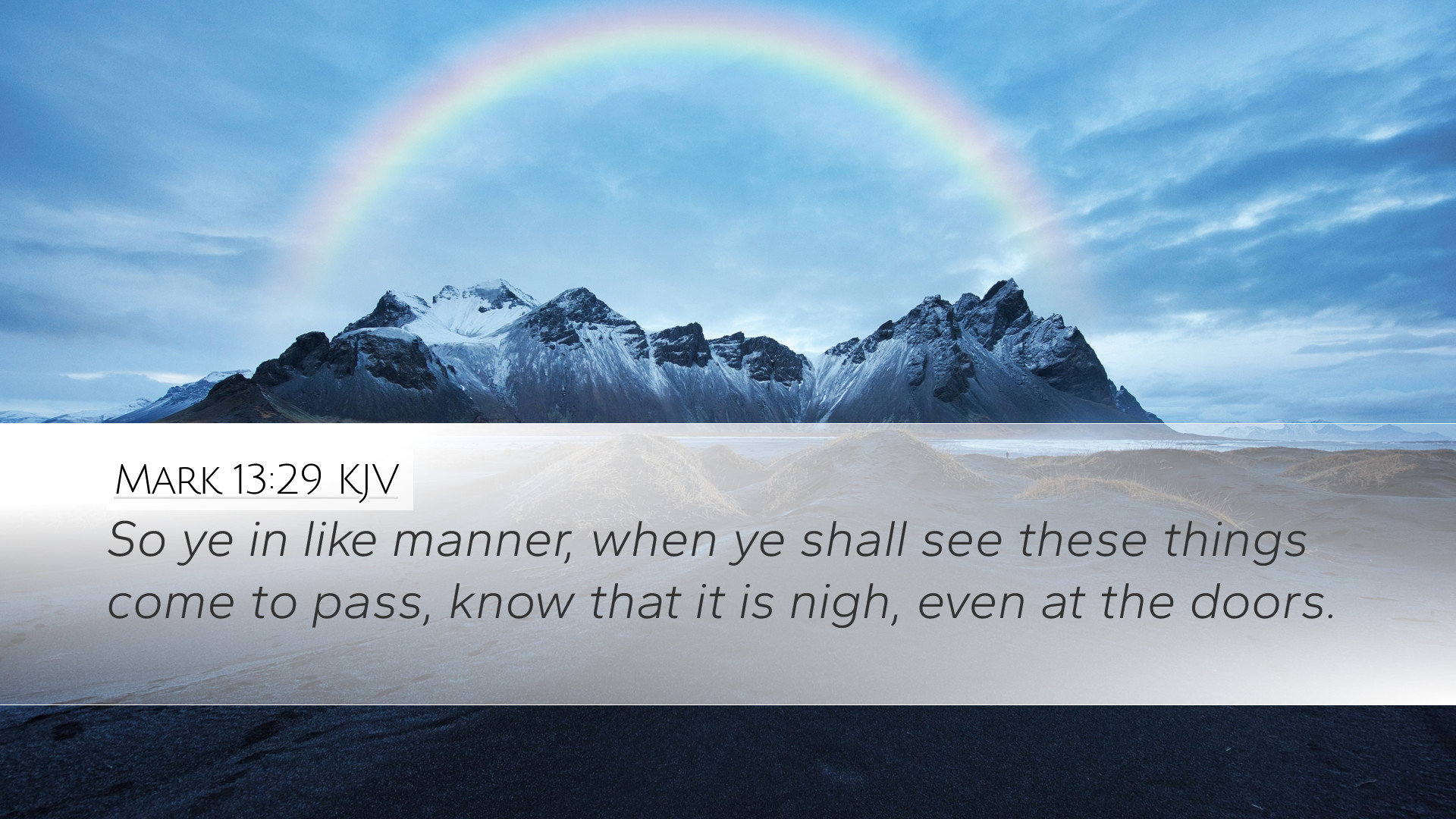Commentary on Mark 13:29
Mark 13:29 states, "So likewise ye, when ye shall see these things come to pass, know that it is nigh, even at the doors." This verse is part of the Olivet Discourse, where Jesus foretells the destruction of the temple, the signs of the end times, and His second coming. This commentary aims to distill insights from public domain sources into a coherent overview for pastors, theologians, and Bible scholars.
Historical Context
Understanding the context of Mark 13 is vital for interpretation. Jesus delivered this teaching on the Mount of Olives, shortly after leaving the temple for the last time, signifying a transition from the old covenant to the new covenant. As Matthew Henry notes, the discourse addresses both immediate and eschatological concerns, merging the destruction of Jerusalem with signs of the end times.
Exegetical Insights
In Mark 13:29, Jesus uses the metaphor of the fig tree to illustrate the importance of recognizing the signs of the times. Albert Barnes explains that the season of fig bearing serves as an analogical sign that when certain prophesied events occur, it indicates the proximity of the end. The phrase "even at the doors" suggests an imminent fulfillment, as Clarke elaborates that Jesus urges the disciples to be vigilant and aware of their surroundings.
Key Themes
- Awareness of Signs: The call to awareness is crucial; believers are to discern the nearness of the fulfillment of God's promises.
- Imminence of End Times: This verse emphasizes the immediacy of the Kingdom of God. Both Barnes and Henry convey that believers must be prepared for Christ's return.
- Encouragement for Vigilance: The illustration of the fig tree serves to encourage readiness, indicating that just as the seasons change, so too will God's fulfillment of His promises.
Application for Believers
Mark 13:29 serves as a poignant reminder for contemporary believers to maintain a state of readiness and watchfulness. Matthew Henry stresses the necessity of living in accordance with the expectation of Christ’s return. This anticipation shapes how believers engage with the world, influencing their ethics and evangelism.
Pastoral Implications
Pastors can utilize this verse to encourage their congregations to live purposefully. The idea that the return of Christ is "even at the doors" should inspire believers to cultivate spiritual fruit, engage in fervent prayer, and share the gospel. In a world filled with distractions, this passage can serve as a potent reminder to prioritize their faith amid uncertainty.
Theological Reflections
Theologically, Mark 13:29 connects the present with the eschatological hope. As Adam Clarke notes, understanding the signs given by Jesus provides a framework for interpreting current events through a biblical lens. The challenge for theologians is to balance the immediacy of this verse with the understanding that "time" is subjective to God, who exists outside of it.
Implications for Eschatology
In eschatological terms, this verse suggests a dual focus: the immediate context of Jerusalem’s destruction and the broader implications for the end of the age. Clarke observes that early Christians grappled with this duality, as many anticipated an immediate return of Christ. This has implications for how modern believers view prophecy and fulfillment.
Conclusion
Mark 13:29 encapsulates a vital message for all believers—recognizing the signs of the times and remaining alert to God's unfolding plan. As believers interpret this verse, they are reminded of their role in God's narrative and the importance of living in hopeful expectation. Resources from public domain commentaries provide a well-rounded perspective, merging historical insights, theological understanding, and practical applications for today’s context. In summary, vigilance, preparedness, and an active engagement with faith are essential responses to the instruction given by Jesus in this passage.


